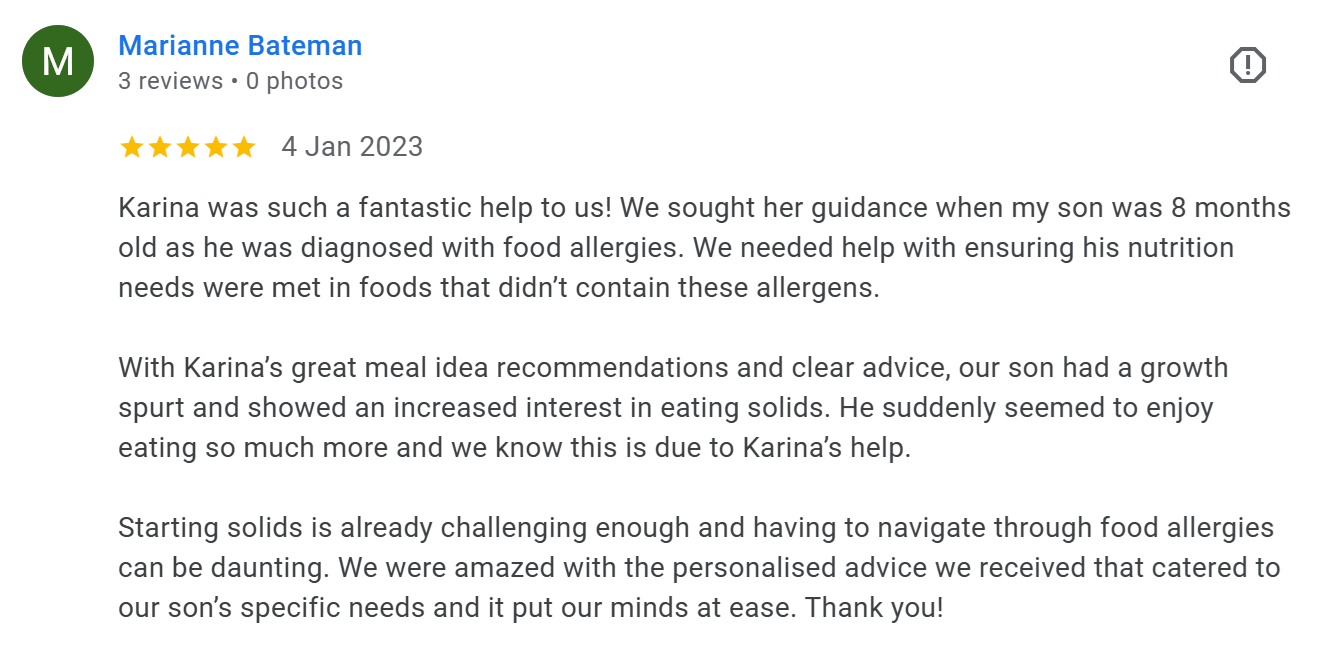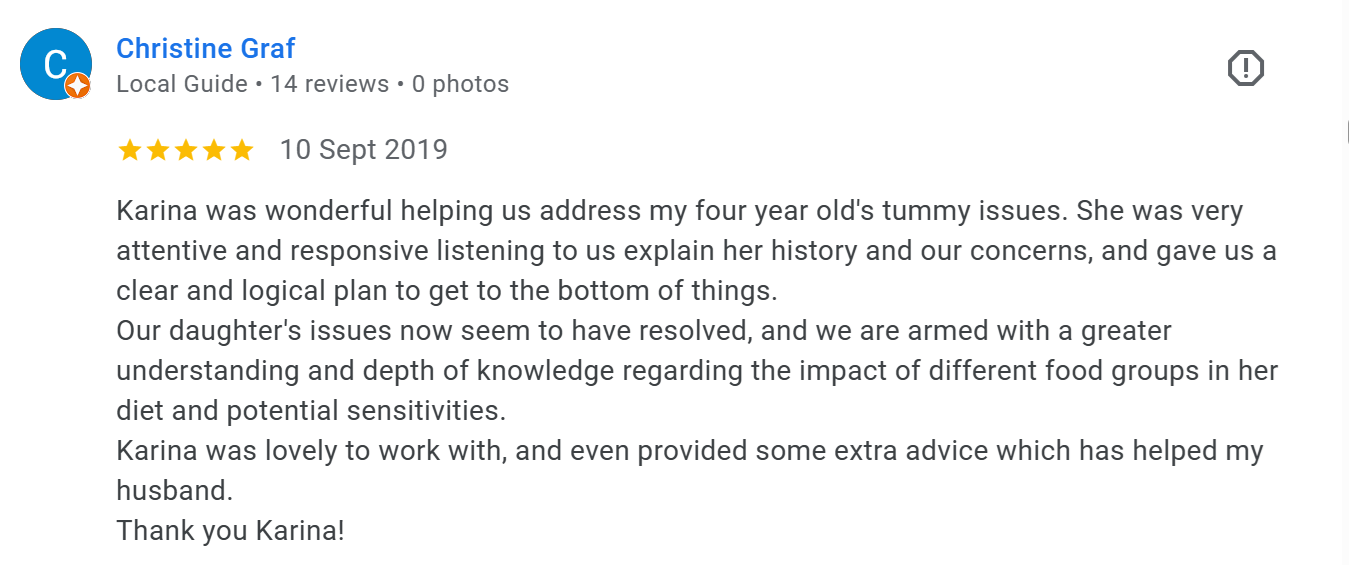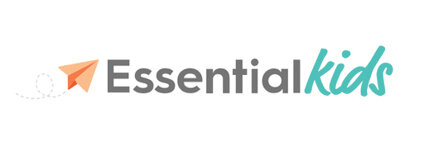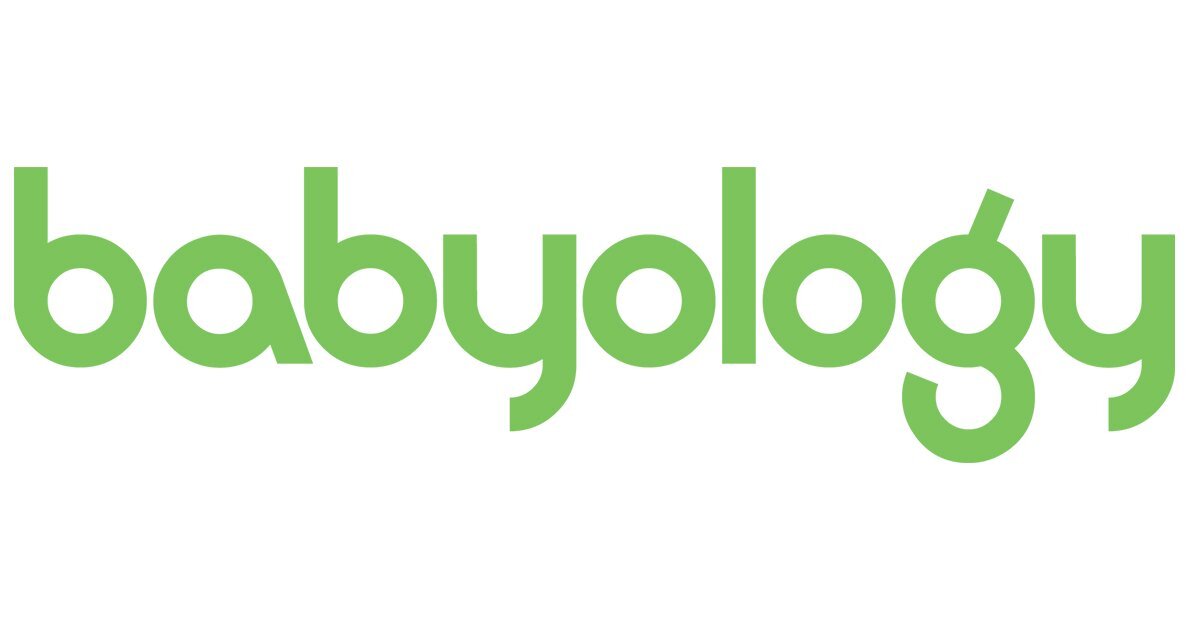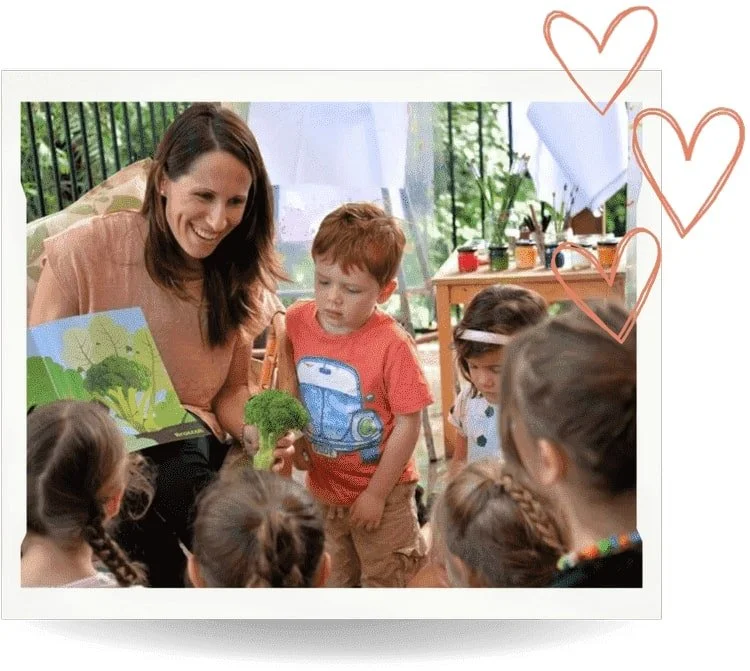
BABY NUTRITION
Baby Nutrition
✔️ Introducing Solids Education
✔️ Failure To Thrive
✔️ Vegetarian / Vegan Babies / Iron Deficiency
Babies with Tummy Troubles
✔️ Constipation, Mucous Poo
✔️ Food allergy, Tummy pain
✔️ Colic, Reflux
CHILD NUTRITION
Child Nutrition
✔️ Underweight or Overweight
✔️ Iron Deficiency
✔️ Vegan / vegetarian children
✔️ Neurodivergent Kids & Feeding Issues (NDIS Approved). * if your child is NDIS Plan managed, please email me for a different link.
Kids With Gut Issues
✔️ Complex Gut Disorders - Coeliac, Crohns,, Irritable Bowel (FODMAP).
✔️ Food Allergy
✔️ Constipation or Chronic Tummy Pain

Fussy Eater Consultation ($499)
If you have a super fussy eater and you experience frustration every single dinner time, then you may be stuck in what Karina calls the feeding circle of despair.
If you worry that your child is literally living on “the white diet” and you feel defeated because you just cant seem to get them to try new foods, no matter how much you try, then it’s time to learn more about Karina’s confident feeding framework.
Knowing how to move from being a frustrated feeder to a confident feeder will change your life forever.
There is SO much information out there, and you just want to cut through the clutter and get advice from a true paediatric nutrition professional.
Karina offers 5 of these packages per month. 1 spot left for February

VIP PREMIUM PACKAGE
12 week Premium Package with Karina ($1997)
(Limit of 5 new families per month)
This Exclusive one-on-one package is designed for parents who want the highest level of personalised support, expert guidance and direct access to Karina as their child’s Expert Paediatric Dietitian.
What’s Included?
Initial Comprehensive Online Consultation (60 mins) - a deep dive into your child’s health history and feeding journey - looking at nutrient status, gut health, parental confidence and mealtime dynamic.
Personalised Menu Plan: Specific to your child/family’s need
Monthly Follow Up Online Consultations (30 mins each) - Targeted sessions to review process, fine tune strategies and ensure lasting changes
3 Months Free Nourishing Kids Membership - Connect to Community, be supported and inspired by fellow parents. Ask questions, share updates and get Karina’s expert advice between sessions in our private chat group.
Free Access to PDF's and Guides that will be helpful to you
Extras: 20% discount on future purchases

As seen in
Take the load off your shoulders - book an online consultation today
Connect with Paediatric Dietician, Karina online - easy “one click” Zoom or Facetime if preferred.
You still receive the same health rebates.
No car parking, no travel… “ zoom in” from your lounge room or office.
Children under 10 not required to be at the appointment
I am truly here to help…
As a mum myself, I truly get it. You may not believe me, but I never judge, honestly!
I’m a good listener - I firstly take in all your concerns and information about your child, then together we create a nutrition plan that works for your family.
By the end of the session, my goal for you is:
You feel reassured and confident with a clear plan that is going to help your child
It is 100% doable for you and your family
It’s evidence based and going to suceed!
Specific areas of interest
• Babies with cow’s milk protein allergy (colic/reflux)
• Carbohydrate intolerances/malabsorption (lactose/fructose/sucrose)
• Food allergy - for example: milk allergy, egg allergy, soy allergy, nut allergy, tree nut allergy
• Vegetarian and vegan diets
• Starting solids
• Iron deficiency
• Irritable Bowel Syndrome (IBS) and the Low FODMAP Diet
• Constipation
• Coeliac Disease
• Underweight/ Failure to Thrive
• Autism/ADHD - NDIS Dietitian
• Sports nutrition for children and adolescents
“Karina is a true professional - with 20 years clinical experience and is also a mum herself”
Feeding kids can be super stressful and as parents we constantly worry.
Karina creates freedom and head space for time poor parents, helping them with a clear plan to give their child the best foundation possible!
Karina lifts the weight off your shoulders with clear and “doable” strategies that benefit the whole family.

Frequently Asked Questions
-
Kids nutrition counselling is a specialised service provided by pediatric dietitians or nutritionists like Karina. It is aimed at helping children establish healthy eating habits, address specific dietary needs, and ensure they receive the right nutrients for their development. Nutrition counselling focuses on the unique nutritional requirements children have at different stages of growth, from infancy to adolescence. In the session, Karina assesses your child’s current eating patterns, health concerns, and lifestyle factors that may affect their diet.
The goal is to create a personalised nutrition plan that improves overall health, supports growth, and helps address any specific concerns, such as picky eating, food allergies, or weight management. This counselling can also help with digestive issues, improving gut health, and enhancing mental and physical development by focusing on nutrient-rich foods. For example, if a child struggles with low energy or concentration in school, a dietitian may focus on increasing intake of iron-rich foods or balancing macronutrients for sustained energy. The benefits of kids' nutrition counselling extend beyond just diet changes. It helps build a positive relationship with food, encourages healthy eating habits that last a lifetime, and empowers children to make informed choices about what they eat. Additionally, parents often gain knowledge and tools to support their child’s health and well-being through balanced, nutritious meals.
-
Parents should consider kids' nutrition counselling at various points in their child’s development, especially if they notice any challenges related to diet or growth. One of the most common times to seek nutrition counselling is during major developmental milestones, such as introducing solid foods, dealing with picky eating, or navigating adolescence, where nutritional needs increase and eating habits may shift due to peer influence or changes in activity levels. Nutrition counselling can also be helpful when your child is facing specific health issues, such as food allergies, intolerances, digestive problems, or weight concerns (either underweight or overweight). Early intervention can prevent further complications and support healthy growth. If your child experiences chronic fatigue, frequent illness, or difficulty concentrating, it could also be a sign of nutrient deficiencies that a pediatric dietitian can help address. Another important time to consider kids nutrition counselling is if your child has a medical condition, such as diabetes, celiac disease, or autism, which requires tailored dietary management. Children with developmental or behavioral conditions can benefit from structured nutrition counselling to support their physical and mental well-being. If you’re ever unsure, it’s always a good idea to seek professional advice when you notice persistent issues related to eating, growth, or behavior.
-
During the session, Karina uses a comprehensive approach to assess a child’s dietary needs. The assessment typically begins with gathering detailed information about the child’s health history, growth patterns, lifestyle, and current eating habits. This helps her understand where potential gaps in nutrition may exist and identify any underlying health conditions that could be influencing the child’s diet. One of the primary tools used in the assessment is a dietary recall, where parents and the child (if old enough) provide a record of what the child eats over several days. This gives her insight into the child’s typical food choices, portion sizes, and eating patterns. A paediatric dietitian will also look at growth charts, body mass index (BMI), and sometimes lab results to check for nutrient deficiencies or concerns, such as low iron or calcium levels. Additionally, pediatric dietitians often explore the child’s eating environment, such as family meal routines, any restrictions on certain foods, and the influence of school or social situations on the child’s diet. They may ask about the child’s physical activity level, sleep patterns, and emotional relationship with food, as all these factors contribute to overall health and nutrition. Based on this comprehensive assessment, the dietitian develops a tailored nutrition plan that addresses specific needs while promoting a balanced, healthy diet.
-
Parents play an essential role in the success of their child's health. They are not just passive participants but active partners in their child’s nutrition journey. Since parents are responsible for providing meals, snacks, and a supportive eating environment, their involvement is key to ensuring that any dietary changes recommended by the dietitian are implemented at home. A big part of counselling involves educating parents on healthy food choices, meal planning, portion control, and strategies to encourage children to try new foods. Parents learn how to manage mealtime challenges, such as dealing with picky eaters, establishing structured meal and snack times, and reducing their child’s reliance on processed or sugary foods.
By working closely with a paediatric dietitian such as Karina, parents can create a home environment where healthy eating is encouraged and modeled, setting a positive example for their children. Parents are also responsible for providing the emotional support their child may need during dietary changes. For children, especially those who struggle with food issues like allergies or weight management, changes to their diet can feel overwhelming. Parents can help by being patient, encouraging, and consistent with the strategies introduced during nutrition counselling. A collaborative approach, where parents work alongside the dietitian and their child, is crucial for lasting success. Furthermore, as children grow older, parents can help them take more responsibility for their eating habits, teaching them how to make balanced food choices when they are at school, at friends’ homes, or out in social situations. This empowers children to develop lifelong healthy eating habits and a positive relationship with food.



